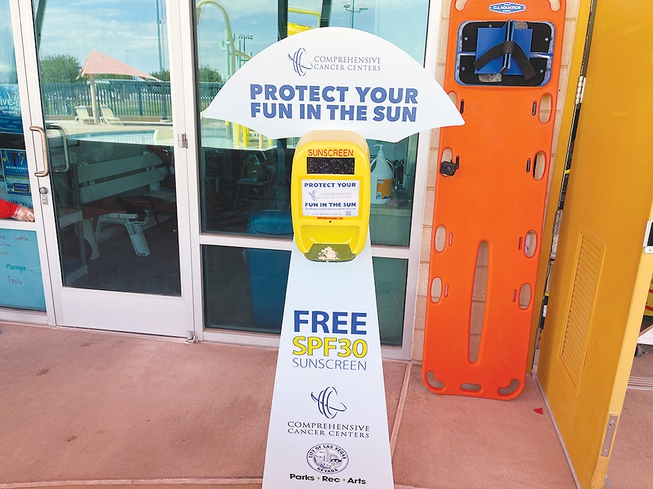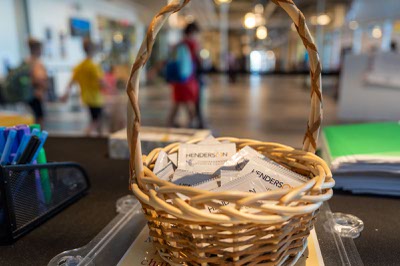
Courtesy
Motion-detecting stands dispensing free SPF 30 sunscreen, such as this one, can now be found at Baker, Doolittle, Garside, Freedom, Municipal and Pavilion Center pools. Comprehensive Cancer Centers also said free sunscreen was available at community centers across Las Vegas, along with community centers and city pools in North Las Vegas through a new partnership with the cities.
Tuesday, July 18, 2023 | 2 a.m.

Comprehensive Cancer Center has partnered with the cities of Las Vegas and North Las Vegas to offer free sunscreen packets and dispensers to help encourage use and decrease the rate of melanoma. Sunscreen packets are currently available at the Henderson Multigenerational Center. Tuesday, July 11, 2023.
Las Vegas heatwave
The city of Las Vegas is offering another tool to managing the effects of Southern Nevada’s blistering sun: free sunscreen.
Through a partnership with Comprehensive Cancer Centers, “a multispecialty practice” for cancer treatment and research, the city recently installed free sunscreen dispensers at various locations in its jurisdiction.
“It’s very important to have (sunscreen) available for the public,” said Rachel Harmon, aquatic recreation leader with the city of Las Vegas. “So it’s really nice that it is free and customers just walk up to the dispenser and get as much sunblock as they want.”
Harmon said she received 12 of Comprehensive Cancer Centers’ free sunscreen dispensers last month and placed them at various pools around the city — two dispensers at each pool.
Residents can find those bright yellow, motion-detecting stands with free SPF 30 sunscreen at Baker, Doolittle, Garside, Freedom, Municipal and Pavilion Center pools. Comprehensive Cancer Centers said free sunscreen also was available at the Cimarron Rose Community Center, East Las Vegas Center, Doolittle Community Center, Mirabelli Community Center, Stupak Community Center and Veterans Memorial Center.
Community centers and city pools in North Las Vegas also offer free sunscreen through the city’s new partnership with the cancer center.
Skin cancer is the most common cancer in Nevada, with more people in the state being diagnosed than all of the other cancers combined, according to the American Cancer Society. The Nevada Cancer Coalition estimates that 800 Nevadans will be newly diagnosed this year with melanoma of the skin, the “more aggressive” of skin cancers.
Sun damage is the main culprit in causing skin cancer, said Rupesh Parikh, an oncologist with Comprehensive Cancer Centers. In Nevada, which experiences more than 300 sunny days annually, Parikh said the risk of developing skin cancer was high for locals because of the lack of cloud coverage and potential for exposure to high levels of ultraviolet rays.
These ultraviolet rays can burn skin, causing sunburns and damaging skin layers, Parikh said. Ultraviolet rays are measured and monitored by the ultraviolet, or UV, index.
The higher the UV index, the stronger those harmful ultraviolet rays are, which leads to increased risk of developing skin damage or cancer, Parikh added.
A thinning ozone layer can also play a factor in how much UV exposure people can get because it can provide a buffer between direct UV exposure and human skin, Parikh said.
Caucasians, people who have freckles and those lacking in UV-absorbing melanin — the natural substance that provides pigmentation in the hair, eyes and skin — are most at risk for contracting skin cancer.
But Parikh stressed that anyone can develop skin cancer at any time of the year.
“Anyone can get sunburned; it’s that repeated exposure,” Parikh said. “(So) it’s all about education. Whether they use our sunscreen or anybody else’s sunscreen, as long as they’re educated saying that, hey, you need to do this because you can burn your skin.”
Sunscreen, specifically SPF 30 or above, can help protect against this sun-related skin damage. People also can avoid sunburns by covering up with loose-fitting or light-colored clothing, Parikh added.
Comprehensive Cancer Centers may have just recently entered into the free sunscreen partnerships with Las Vegas and North Las Vegas, but it’s been fully funding and providing for residents for the past decade.
Clark County Parks and Recreation, the city of Henderson , the Regional Transit Committee, Las Vegas Aviators, Downtown Summerlin and the Vegas Golden Knights, among others, have already partnered with Comprehensive Cancer Centers to deliver free sunscreen to residents.
Mackenzie Coombs-Emery, an RTC spokesperson, said the RTC began partnering with Comprehensive Cancer Centers in 2019 to bring free sunscreen to bus riders as part of RTC’s annual “Summer Heat” campaign.
During the weekly Summer Heat events at transit centers in the valley, Coombs-Emery said she sees anywhere from 100 to 150 people stop by their tables to grab some free sunscreen. The giveaway has become “a really big hit with (their) transit riders.”
There are people who even stop by repeatedly to grab some before getting on the bus, she added.
Comprehensive Cancer Centers’ donation to the RTC includes individual packets ofsunscreen as well as refills for the dispensers.
Informational pamphlets are also provided so the RTC can share information with its riders to raise awareness of skin cancer and how to look for any warning signs.
“Our partnership with Comprehensive Cancer Centers is really vital to keeping our riders safe in summer months,” Coombs-Emery said. “It really helps us with getting resources to our riders so they can be safe.”
Sometimes, sunscreen can have a hefty price tag. A 2022 study by researchers with the Northwestern University Feinberg School of Medicine’s department of dermatology found participants were willing to pay an average of $32.10 monthly for their preferred sunscreen.
A single bottle of SPF 50 sunscreen could cost you at least $10, according to Consumer Reports.
That cost can become a burden, Harmon said, especially in the summer when people are outside and exposing more skin, which requires them to use more sunscreen. When choosing between sunscreen or other necessities, people may forgo the skin-protecting cream altogether.
“The price of sunblock is pretty expensive, and when you’re reapplying it every 30 minutes to every hour — which they should be — you can run out of a bottle of sunblock very quickly,” Harmon said.
As long as the demand for free sunscreen continues, Parikh said Comprehensive Cancer Centers would continue to pursue these partnerships. For him, it’s all about informing the public and “prevention, prevention, prevention,” especially as more people continue to flood into Southern Nevada.
“It’s just about education; that’s the key, so it’s education (and) layer up, layer up, layer up,” Parikh said. “We want to try and prevent, (and) if we do find skin cancer, the earlier the better.”
